Leipzig battle. Part of 2
But the spirit in him is strong and strong
And the glory of Mother Russia
He did not disgrace the battle.
In front of french bayonets
He did not break the Russian heart
On death for the Motherland, for the brothers
He looked with secret pride.
Soldier song about the grenadier Leonty Korennoy.
Progress 6 (18) October
At 7 in the morning, the Allied Command issued an order for an offensive. The columns of the Allied forces attacked unevenly, some began to move late, as a result of a simultaneous strike on the entire front did not work. Austrian troops under the command of the Crown Prince of Hesse-Homburg attacked on the left flank. The Austrians attacked the French positions at Delitsa, Dezena and Lossnig. Austrian troops tried to push the French away from the River Pleisse. At first they captured Döhlitz, and around 10 hours - Dezen. The fight was hard, the French fought much more fiercely than was necessary to cover the retreat. Constantly counterattacked. The Prince of Hesse-Homburg was seriously wounded, and Jerome von Collored assumed command. He himself was wounded in the chest, but he hid it from others, continuing the battle at Konniewice and Delitsa. The Austrians made their way to Konniewicz, but then two French divisions sent by Napoleon arrived under the command of Marshal Oudinot. French troops launched a counterattack, and the Austrians withdrew from Konniewice. Left and Dezen. The Austrians withdrew, regrouped their forces, and again went on the offensive. By lunchtime they captured Loesnig, but they could not re-take Konnevitts, which the Poles and the Young Guard under the command of the marshals Oudinot and Augereau defended.
Napoleon's rate was located at Stuteritz. A stubborn battle broke out in the center, in the region of Probstade (Probstheid), where the troops were kept under the command of Marshal Victor and General Loriston. The village had a stone wall, and was an important node of the French defense. The general leadership of the Russian-Prussian troops, who attacked in this direction, was carried out by Barclay de Tolly. First, two Prussian brigades from Kleist's corps attacked. Prussian soldiers were able to make their way into the village from the east, but were met with kartechnym fire and moved away. Then the Russian corps of Eugene of Württemberg went on the attack. Troops of Shakhovsky, Gorchakov and Kleist broke into the village. However, Napoleon at the head of the Old Guard and Guards Artillery, General Drouot (near 150 guns) launched a counterattack and drove the Russian-Prussian troops out of the village. But the further advance of the French troops was stopped by strong artillery fire. Both sides suffered heavy losses. The battle lasted until nightfall, but the Allied forces could not get through to Probstade.
The situation on the right flank and to the north was the best. The army of General Bennigsen was advancing on the right flank. She moved on the enemy with a strong delay, about 2 hours of the day. Russian troops captured Zukelgausen, Holzhausen and Paunsdorf. Despite the objections of Bernadot, the troops of the Northern Army, the Prussian corps of General Bülow and the Russian corps of General Wintzingerode, took part in the storming of Paunsdorf. In the north, the troops of Lanzheron and Saken (Silesian Army) captured Schönefeld and Golis. At the height of the battle, Napoleon’s German allies betrayed him - the entire Saxon division (3 thousands of soldiers, 19 guns) went over to the side of the allies, followed by Wurttemberg, Westphalian and Baden units. This seriously complicated the defense of Leipzig. Saxons even immediately took the side of the allied army. True, it did not save Saxony, it became a state for the post-war divide between the winners.
In the eastern and northern directions, French troops were pushed back to the 15-minute march from the city. In the western direction, the Austrians showed no activity on that day. Commander Schwarzenberg doubted the need to force Napoleon to the final battle, not for life, but for death. Therefore, he ordered the Gyulai 3 Corps only to watch the French and not to storm Lindenau.
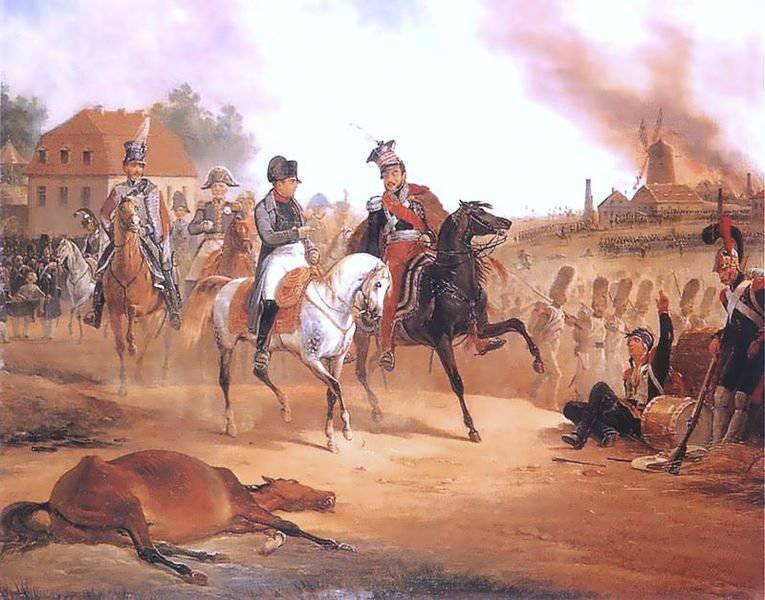
Napoleon and Poniatowski near Leipzig. Sukhodolsky (XIX century).
7 (19) October Actions
The capabilities of the French troops to the defense of Leipzig were exhausted. The numerical superiority of the enemy affected more and more. German troops went over to the side of the allied army. Ammunition came to an end. According to the report of the chief of artillery, the army spent several days 220 thousands of cores, only 16 thousand shells remained, and delivery was not expected. Napoleon did not count on a long battle and defense of the city, planning to win a decisive victory. Some warlords advised the emperor to continue the battle - to burn the outskirts of the city, to hold on to the walls. But the French emperor decided to retreat.
Measures for the preparation of a possible retreat were taken insufficient. In particular, having prepared a single bridge for an explosion, the French did not think about setting up several additional crossings, in case of departure. Due to this, the French troops could retreat only in one direction to Weissenfels. The French general Bertrand, the corps commander covering the western direction, began to withdraw troops, carts and artillery to Weissenfels, through Lindenau in the direction of Salle. At night, the rest of the troops followed him, first the guards, artillery and the corps of Victor and Augereau. The troops of Macdonald, Ney, and Loriston were to cover the withdrawal.
The Allied Command on that day made a big mistake. The fierce resistance of the French troops 6 of October led many to conclude that the next day Napoleon’s army would continue the battle. Although assumptions about the need to strengthen the left flank and its ability to pursue the enemy were put forward. Thus, the Russian emperor Alexander Pavlovich suggested concentrating efforts on forcing the Place Pleis and Veisse-Elster, and the Prussian warlord Blucher spoke of the need to single out 20 thousand cavalry group to pursue the enemy. Later, General Gyulai, who commanded the troops in the western direction, was accused of allowing Napoleon's troops to retreat, avoiding captivity. But his explanations were found to be satisfactory, since he acted on the orders of Prince Schwarzenberg.
While the French forces were retreating through the western Randstad Gate, the Allied armies launched an offensive. The king of Saxony, Friedrich-Augustus I, offered to surrender the city without a fight if the Allied command gave 4 hours to the French to retreat. But Emperor Alexander I rejected this offer and gave the order to launch an offensive. General Toll delivered the answer to the Saxon monarch, he also organized protection for him when the Russian troops began to storm the palace.
Due to the fact that all the troops had to retreat only along one road, the hustle and confusion began. The French emperor himself was only able to get out of Leipzig. Russian troops under the command of Generals Lanzheron and Osten-Sacken occupied the eastern suburb of Halles, the Prussian units under the command of General Bülow the suburb of Grimmas, the troops of Bennigsen seized the southern gates of Leipzig-Peterstor. The chaos in the French army reached its peak when the sappers mistakenly blew up the Elsterbrueck Bridge, which was located in front of the Randstad Gate. Hearing cries of “Hurray!” In the distance, they decided that it was necessary to stop the enemy’s offensive and destroyed the bridge. And in the city there were still about 20-30 thousand French, including marshals MacDonald and Poniatowski and generals Loristona and Renier. Do not have time to evacuate and hospitals. Many died, including trying to swim across the river and climb the steep opposite shore, under enemy fire, others were captured. Marshal MacDonald swims across the river. Poniatowski, who fought well in the Leipzig battle, and the only foreigner in the service of Napoleon, received the title of French marshal, was wounded and drowned during the crossing. Loriston was captured. By one o'clock the city was completely captured.
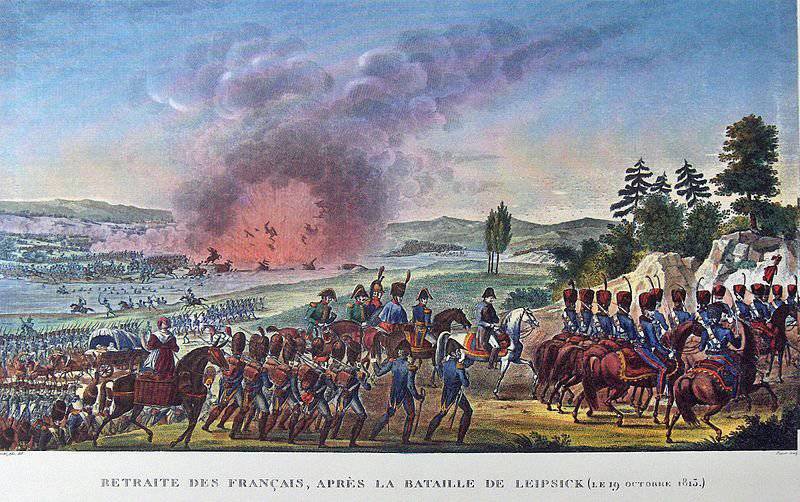
The retreating French army blows up the bridge prematurely. Colorized engraving of the XIX century.
The very undermining of the bridge characterizes the degree of chaos that was happening at that time. Napoleon entrusted this task to General Dulolui, then, in turn, placed the responsibility for preparing the bridge for destruction on a certain Colonel Montfort, who left his post, leaving it to the corporal of the engineering troops. When a warrior asked when the charge should be ignited, he was told: "When the enemy first appeared." The battle cries and the appearance of several Russian riflemen near the bridge, from where they began to fire at the enemy, became an occasion to lift the bridge into the air, although it was packed with French troops. The corporal executed the order exactly. Thousands of French were doomed to death and captivity. In addition, the undermining of the bridge, the only crossing, finally deprived those troops who still fought in the rear guard, who had no will to resist. And the maneuver of the Old Guard, which turned on the opposite bank to protect the rearguard troops, was in vain.
Prince Schwarzenberg informs the Allied monarchs of the victory in the "Battle of the Nations" at Leipzig. Johann Peter Kraft. 1817 City Military Museum stories, Vienna.
Results
Napoleon's army suffered a crushing defeat, but escaped (largely due to the disorderly conduct of the Allied Command) encirclement and complete destruction. Neither Commander Schwarzenberg, nor the Council of the Three Emperors could not fully carry out the leadership of the hostilities of a huge allied army. The good odds to complete the won have been lost. The lack of unity of command prevented the implementation of broad operational plans, led to indecision of actions of some parts of the army, when others had to withstand the brunt of the enemy's blows, reserving large masses of troops that were inactive at the time when the outcome of the battle could be decided. The decisive role in the battle was played by the Russian troops, who withstood the strongest blows of Napoleon’s army.
French troops lost about 70-80 thousand people: 40 thousand killed and wounded, 30 thousand prisoners (including those captured in hospitals), several thousand Germans went over to the side of the allied army. In addition, an outbreak of typhus began in the French army, and Napoleon was able to bring only about 40 to the Thousands of soldiers to France. The French army lost one marshal and three generals killed, the king of Saxony, two corps commanders (except Loriston, captured the commander of Rainier 7 corps), two dozen divisional and brigade generals were taken prisoner. The army lost half the artillery - 325 guns, 960 charging boxes, 130 thousand guns (including Leipzig arsenals) and most of the convoy.
Allied troops also suffered heavy losses - up to 54 thousand killed and wounded, of which up to 23 thousand Russian (killed or injured by 8 generals - Neverovsky, Shevich, Guiney, Kudashev, Lindfors, Manteuffel, Reveny and Schmidt), 16 thousand Prussians, 15 Thousands of Austrians and 180 Swedes. The low losses of the Swedish troops are explained by the fact that Bernadot coast troops for the war with Denmark for Norway. For valor in this battle, four Russian military leaders - Kaptsevich, Osten-Sacken, Grand Duke Konstantin Pavlovich and Yevgeny of Württemberg received the Order of Saint George of the 2 degree. Peter M. Kaptsevich, despite the strong concussion, was one of the first to burst into the city. Osten-Sacken was noted for taking the Gallic suburb. The corps of E. Württemberg distinguished itself in the battle for the Wachau and Probstade. Grand Duke Constantine commanded reserve units, which also distinguished themselves in battle. This is an exceptionally high score, especially considering the fact that only one person was awarded with this order for the Battle of Borodino - Barclay de Tolly, and in just 150 years of the order of St. George 2 degree he was awarded only 125 times. Barclay de Tolly, who was one of "the main perpetrators of the victory," taught the honor, together with the emperor, to enter Leipzig and was elevated to the count's dignity of the Russian Empire.
The temple is a monument to Russian glory in Leipzig. 1913, architect V.A. Pokrovsky.
The defeat of Napoleon’s army had a great military-strategic and political effect. Napoleon's troops retreated across the Rhine into France. The fortresses left behind the French, many of which were already deep in the rear of the Allies, began to surrender one by one. In November-December 1813 of the year and January of 1814 of the year capitulated - Dresden (Saint-Cyr surrendered there with the 14 corps), Torgau, Stettin, Wittenberg, Kiustrin, Glogau, Zamost, Modlin and Danzig. By January, 1814 had capitulated all the French fortresses on the Vistula, the Oder and the Elbe, except Hamburg (he was defended by Napoleon’s “iron marshal” - Davout, he surrendered the fortress only after Napoleon’s abdication) and Magdeburg. They lasted until May 1814. The capitulation of the fortress garrisons deprived Napoleon of about 150 thousand soldiers and a huge amount of artillery necessary for the defense of France. Only in Dresden, about 30, thousands of people, surrendered with 95 guns of field troops and 117 serf guns.
France was left alone against the whole coalition. Subject to the Emperor Napoleon, the Rhine Union of German states collapsed. Bavaria took the side of the anti-French alliance, it was followed by Württemberg. Saxony was withdrawn from the war. Virtually all small German state formations joined the coalition. France was to begin withdrawing troops from Holland. Denmark was isolated by Swedish troops and was forced to capitulate under the pressure of Sweden and England. One of the leading commanders of Napoleon, King of Naples Murat, concluded a secret treaty with Austria, and moved his forces against the troops of the Kingdom of Italy, led by Eugene Beauharnais (admittedly, he avoided active hostilities, pulled out time and conducted secret negotiations with Napoleon).
In early January 1814, the anti-French coalition launched a new campaign, invading France. Napoleon was left alone with France against the forces of almost the whole of Europe, which led to his defeat and abdication.
Monument in memory of the Battle of Leipzig and its reflection in the "Lake of Tears Spilled on Fallen Soldiers." 1913 year.
1 application. Capture of General Loriston
In the "Officers' Notes" N. B. Golitsyn describes the capture of General Loriston in this way: “One of the prisoners unbuttoned his overcoat, showed us his insignia and announced that he was General Loriston. We quickly took him with us. Not far from there, we had the rather wide street of the Leipzig suburb, which crossed our road. At the same time as we were going to move through it, we saw the French battalion, which was walking in the greatest order, with loaded guns. Ahead there were about twenty officers. When we saw each other mutually, we stopped. The meanders of the path along which we rode, and the trees that were on its sides, hid our small number. General Emmanuel, feeling that it was impossible to think for a long time here, and noticing some confusion between the French, shouted to them: “Bas les armes!” (“Throw weapon! ”) The amazed officers began to consult each other; but our intrepid chief, seeing their hesitation, shouted to them again: "Bas les armes ou point de quartier!" ("Drop your weapon, you will not be spared!") And at the same instant, waving his saber, he turned with astonishing the presence of the spirit to his small detachment, as if to command an attack. But here all the French guns fell to the ground as if by magic, and twenty officers, led by Major Augereau, brother of the marshal, presented their swords to us. ” And what about Loriston? “Loriston, deep in thoughts during a strange procession with over four hundred people who laid arms in front of twelve Russians, addressed our boss with the question:“ To whom did I have the honor of giving my sword? ”“ You had the honor to surrender, ”he answered,“ to the Russian to Major General Emmanuel, the commander of three officers and eight Cossacks ”. It was necessary to see the disappointment and despair of Loriston and all the French. "
On the way to their ga Emmanuel talked with the Marquis de Lauriston.
“Ah, General, how unstable is military happiness,” the latter complained.
- More recently, I was ambassador to Russia, and now I am her prisoner!
“What happened to you,” answered Emmanuel, “could well have happened to me.”
2 application. Outstanding feat soldier Root.
Leonty Korenoy (Uncle Korenoy), a Russian grenadier soldier who served in the Finnish Life Guards, a hero of the Battle of Borodino, committed a feat during the Battle of Leipzig, which even admired the French Emperor Napoleon and became known to the whole army.
Battle participant A.N. Marin, the first historian of the Life Guards of the Finnish Regiment, described this feat in the following way: “In the battle of Leipzig, when the Finnish regiment drove the French out of the village of Gossa, the 3 battalion of the regiment walked around the village, the battalion commander Colonel Gervais and his officers first climbed over the stone the fence, and the rangers rushed after them, drove the French already; but, being surrounded by numerous enemies, they firmly defended their place; many officers were injured; then Root, having transplanted the battalion commander and his wounded commanders through the fence, collected the remote, desperate rangers himself and began to defend, while other rangers rescued the wounded officers from the battlefield. Root with a handful of dashing shooters stood firmly and held the place of the battle, shouting: "Do not give up, guys." At first they fired, but the large number of enemies oppressed ours so that they fought back with bayonets ... everyone fell, some were killed and others wounded, and Root was left alone. The French, marveling at the brave huntsman, shouted for him to surrender, but Roynna responded by turning the gun, taking the barrel and fighting with the butt. Then a few enemy bayonets laid him in place, and all of our desperately defended people lay around this hero, with heaps of French killed by them. “We all mourned,” adds the narrator, “the brave Uncle Korennoy.” A few days later, to the great joy of the whole regiment, “Uncle Royornoy” appeared from captivity, covered with wounds; but, fortunately, the wounds were all not heavy. " Covered with 18 wounds, Rootne, returning to the regiment, told about his time in captivity, where the fame of his outstanding bravery spread to all French troops, and he himself was introduced to Napoleon, who asked to see the Russian wonder-hero. The act of Korennoy so admired the great commander that he ordered the Finnish grenadier as an example to all his soldiers in order for his army.
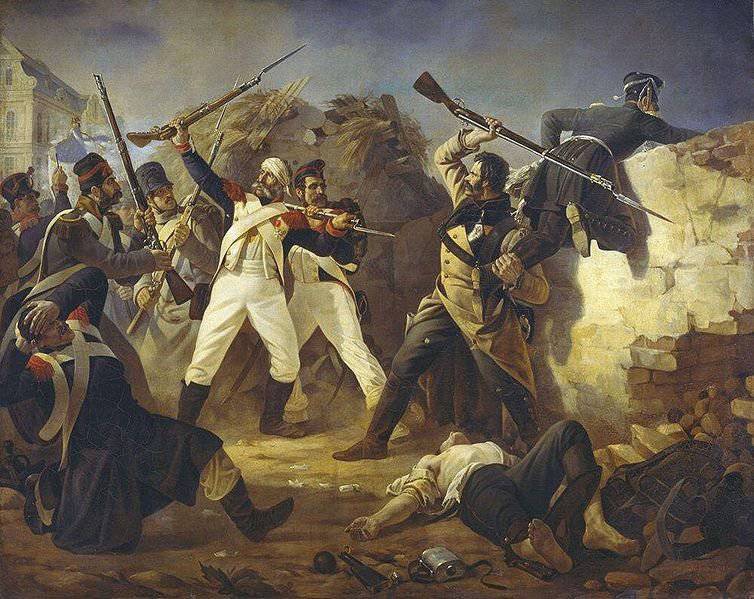
The feat of the grenadier of the Life Guards of the Finnish regiment, Leonty Korennogo in the battle of Leipzig 1813. P. Babaev (1813 — 1870).
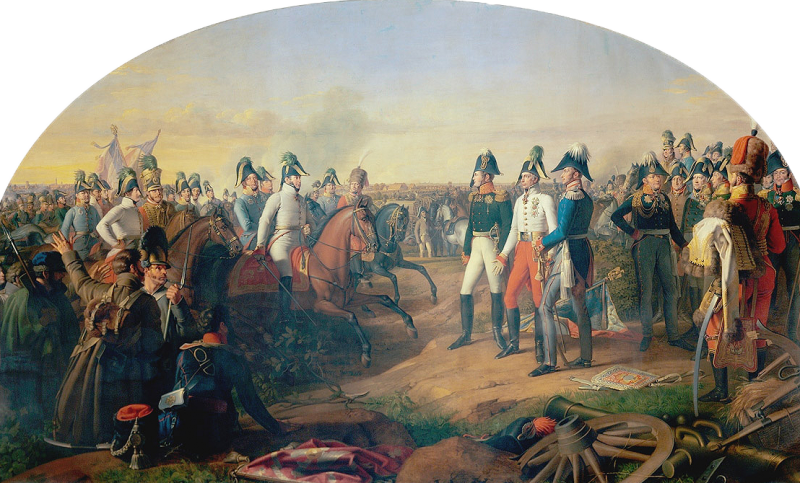
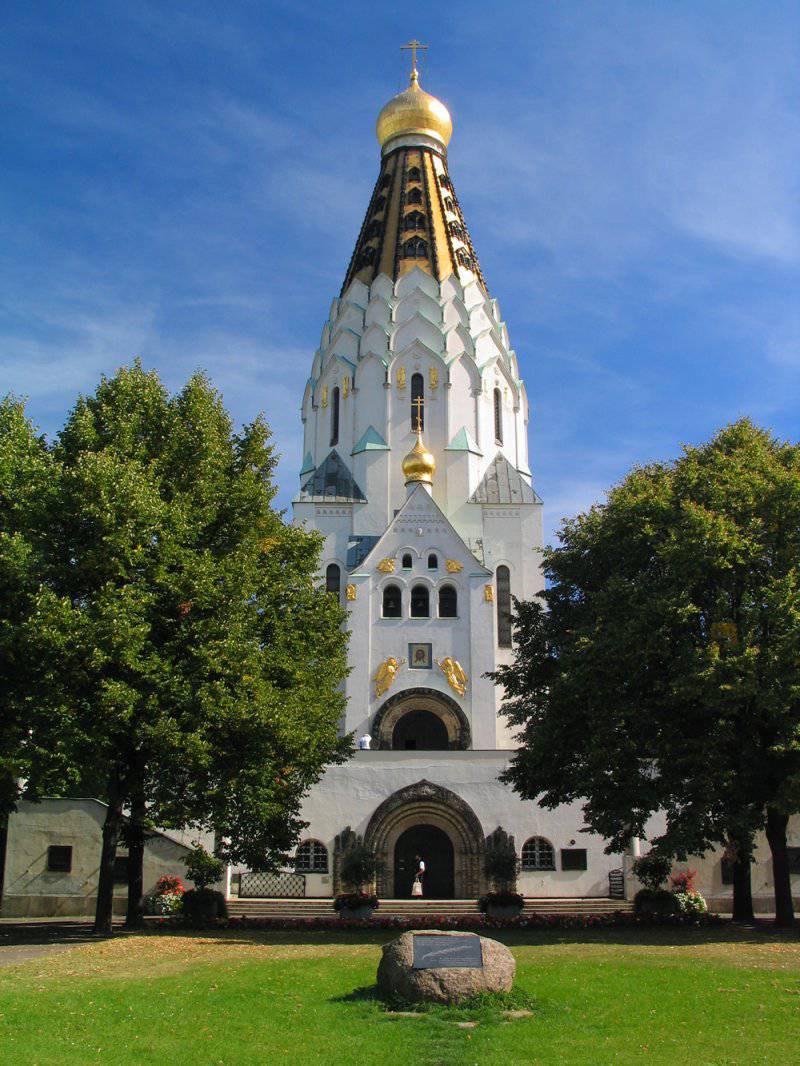
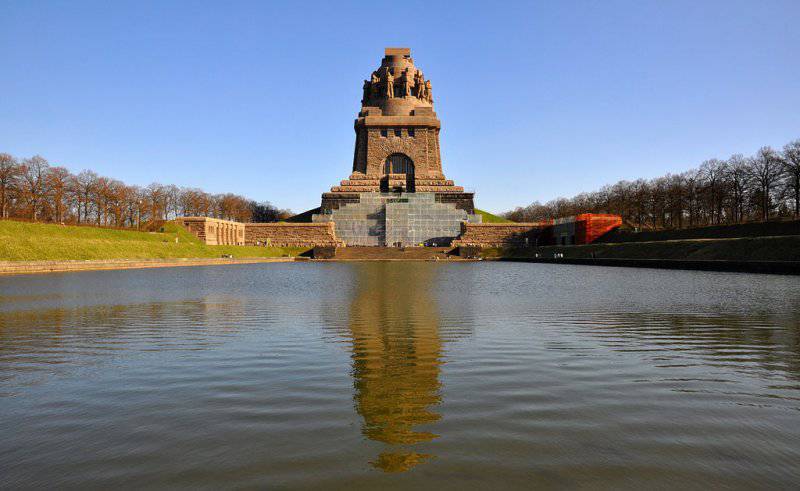
Information